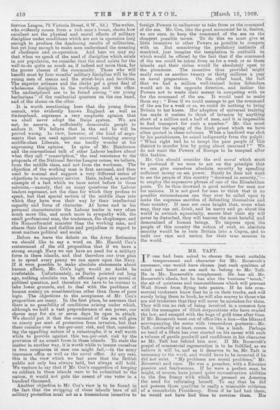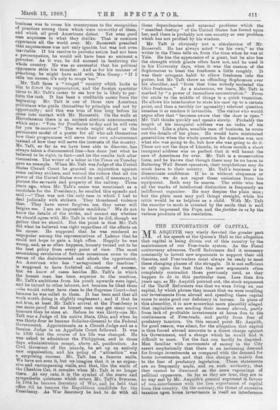MR. TAFT.
IF one had been asked to choose the most suitable temperament and, character. for Mr. Roosevelt's successor, one would have chosen just such qualities of mind and heart as are said to belong to Mr. Taft. He is Mr. Roosevelt's complement. He has all Mr. Roosevelt's ideals, but he has also the business " touch," the air of quietness and reasonableness which will prevent Wall Street from flying into pauics. If he lets com- mercial tricksters know that he is on their tracks, and will surely bring them to book, he will also convey to those who are not tricksters that they will never be mistaken for them. They will run no risk of being involved in a common fate with the managers of illicit corporations who have evaded the law, and escaped with the bags of gold time after time. If Mr. Roosevelt went out of office like a lion—the blizzard accompanying the scene with tremendous portents—Mr. Taft, outwardly at least, comes in like a lamb. Perhaps no head of a State has ever started on his career with such a volume of gentle goodwill and confidence in his character as Mr. Taft has behind him now. If Mr. Roosevelt's gospel of commercial regeneration is to be fulfilled, as we believe it will be, and as it deserves to be, Mr. Taft is necessary to the work, and would have to be invented if he did not exist. "My problems are moral problems," Mr. Roosevelt said once. He was a preacher, with a Knoxiau passion and fearlessness. If he were a perfect man, he might, of course, have joined quiet reconstructive abilities to the fine frenzy with which he pressed on America the need for 'reforming herself. To say that be did not possess those qualities is• really a miserable criticism of a remarkable Presidency. Even if he bad had them, lie would not have had time to exercise them. His businese was to rouse his countrymen to the recognition Of practices among them which were unworthy of them, and which all good Americans detest. Yet even good men acquiesce in what they dislike. That is common experience all the world over. Mr. Roosevelt preached that acquiescence was not only ignoble, but wee not even inevitable. If his resolve to provoke action had not been a preoccupation, he would not have been so eminent a provoker. As it was, he did succeed in bestirring the whole country. He was so successful that his political opponents stole his thunder, And as for his manner of peeaehing, he might have said. with Mrs, Gawp "It I calls 'em names, it's only to rouge 'em," Mr. Taft faces a " rouged " country which looks to him to direct its regeneration, and the foreign spectator turns to Mr. Taft's career to see how he is likely to per- form the task. It has been a creditable career from the beginning. Mr. Taft its one of those rare American politicians who guide themselves by principle and not by ofrportenity ; and this was true of him long before he came into oontadt with Mr. Roosevelt. On the walls at Herculttneem there is an ancient eleetion announcement which says : "Vote for Proclinius to-day and he will vote for you to-morrow." he words might stand as the Permanent model of a poster for all who ask themselves how their programmes will serve their own advancement instead of how they will serve the interests of the country. Mr. Taft, so far as we have been able to discover, has always taken a disinterested line—has done just what he believed to be right, in fact—and let the results look after themselves. The writer of a letter in the Times onTueeday gave an example. When Mr, Taft was Judge of the United. States Circuit Court he granted an injunction against some railway strikers, and warned the rioters that all the power of the United States would be used, if necessary, to protect the servants and. property of the railway. Three years ago, when Mr. Taft's name was mentioned as a candidate for the Presidency, he recalled this episode and said :—" That was not the only case ilk which I bad to deal judicially with strikers. They threatened violence then. They have never forgiven me, they never will forgive me. I am an impossible candidate." We do not know the details of the strike, and cannot say whether we should agree with Mr. Taft In what he did, though We gather that we should. But the point is that Mr. Taft did what he believed was right regardless of the effects on his career. He supposed that he was rendered so unpopular among the representatives of Labour that he could not hope to gain a high office. Happily he was wrong, and, as so often happens, honesty turned out to be the best policy from every point of view. The most astonishing revulsions of fortune sometimes come to the rescue of the disinterested and abash the opportunist. An American who has "antagonised the machine " is supposed to have forfeited all chances of success, but we know of cases besides Mr. Taft's in which the honest man has been superior to the machine. Mr. Taft's ambitions from his youth upwards were legal, and he turned to other labours, not because he liked them —he would rather have risen to the Supreme Court—but because he was called. to them. It has been said that all work worth doing is slightly unpleasant ; and. if that be not true, at least Mr. Taft's arrival at the Presidency is one more proof that an honest man may get many more honours than he aims at. Before he was thirty-one Mr. Taft was a Judge of his native State, Ohio, and when he was thirty-four he became Solicitor-General to the Federal Government. Appointments as a Circuit Judge and as a Session Judge in an Appellate Court followed. It was in 1900 that the course of his life was changed. He was asked to administer the Philippines, and in those days administration meant, above all, pacification. As Civil Governor of the islands, he set up an entirely new organisatiou, and his policy of "attraction" was a surprising success. Mr. Taft has a famous smile. We have not seen it, but we imagine that it is an expan- sive and encompassing smile, and that, like the smile of the Cheshire Qat, it remains when Mr. Taft is no longer Owe. ,tat any rate, it is the symbol of the suave and sympathetic quietness which covers Mr, Taft's! firmness. 14 1904 he became Secretary of War, and be held that office till be became the Republican candidate fur the Presideney. As War Secretary he had to do with all those dependencies and external problems which the "manifest destiny "of the United States has forced upon her, and there is probably not one country or one problem which has not profited by his wisdom. Mr. Taft is obviously not a sitnulacrum of Mr. Roosevelt. He has always acted "on his own," as the writer in the Times tells us, from the time when he wee at Yale. He has the appearance of a giant, but he also has the strength which giants often have not, and he used it in his University days, when it was the custom of the Sophomores to treat the freshmen a little roughly. It was their arrogant habit to elbow freshmen into the gutter, but Mr. Taft threw an offending Sophomore over his shoulder, and "from that time nobody molested the Ohio freshman." As a statesman, we learn, Mr. Taft is marked by "a power of immediate concentration." From the smile to the middle of things is a quick transition. He allows his interlocutor to state his case up to a certain point, and then a terribli (or agreeably) relevant question smashes it or renders it invincible. The visitor who would argue after that "becomes aware that the door is open." Mr. Taft thinks quickly and speaks slowly. Probably the length of his inaugural address was an index of his method. Like a plain, sensible man of business, he wrote out the details of his plans.. Ho would have mistrusted generalities when the whole question for America was, not what she was going to do, but how she was going to do it. These are not the days of Lincoln, in whose mouth a short inaugural address was so perfect that it will haunt the ears of Americans for ever. Mr. Taft is a conservative force, and he knows that though there may be no harm in fluttering Wall Street operators, their trepidations may do mud, harm to their country. Mr. Taft's business is to disseminate confidence. If he is without eloquence or subtlety, we do not regret these omissions from his equipment. Both may be snares. The critic who has all the marks of intellectual distinction is frequently an indifferent organiser. He may despise the plain man ; but the plain man may pull things straight, while his critic would be as helpless as a child. With Mr. Taft the suaviter in mode is attested by the smile that is said to have impressed the Pope, and the fortiter in re by the various products of his resolution.







































 Previous page
Previous page